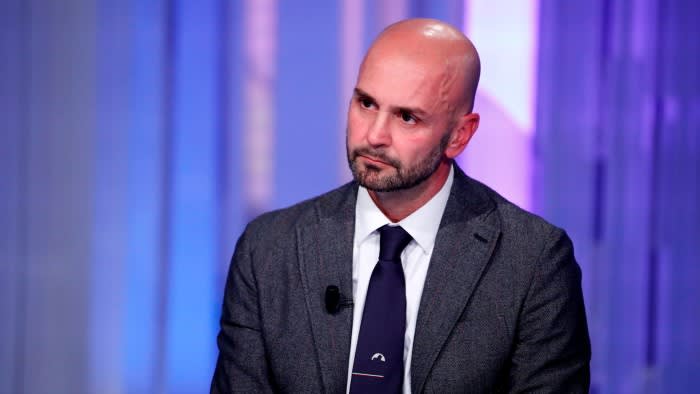Unlock the Editor’s Digest for free
Roula Khalaf, Editor of the FT, selects her favourite stories in this weekly newsletter.
This article is an onsite version of our Europe Express newsletter. Premium subscribers can sign up here to get the newsletter delivered every weekday and Saturday morning. Standard subscribers can upgrade to Premium here, or explore all FT newsletters
Good morning. A scoop to start: European banks still operating in Russia — including Raiffeisen, UniCredit, ING and Deutsche Bank — paid more than €800mn in tax to the Kremlin last year, according to a Financial Times investigation.
And more news to come: today is Spanish Prime Minister Pedro Sánchez’s self-imposed deadline to decide whether he will resign over corruption allegations against his wife.
Here, our parliament correspondent interviews the head of Europe’s hard-right ECR group, and our Rome bureau chief explains why Giorgia Meloni is running in the European parliament elections — despite being a sitting prime minister.
Anything but green
A major party Ursula von der Leyen may need to secure another term as European Commission president has trashed one of her crowning achievements: the EU’s Green Deal climate package, writes Andy Bounds.
Context: Polls predict that the hard-right European Conservatives and Reformists group will make the biggest gains in June’s European parliament elections, meaning that von der Leyen might need their votes to remain in the Berlaymont.
Nicola Procaccini, co-leader of the group and a key figure in Italy’s ruling Brothers of Italy party, told the FT that von der Leyen made “a lot of mistakes” during her five-year term.
“Obviously the Green Deal was crazy and sort of a religion,” Procaccini said.
The Green Deal — which won von der Leyen support from the Socialists and Liberals in 2019 — set ambitious targets for biodiversity and emissions reduction. Farmers and businesses are now complaining about the cost.
Procaccini also hit out at a growing concentration of power in Brussels, saying the EU was established as “a confederal system, not a superstate”.
Procaccini said his group, which is predicted to win around 80 seats in the 720-strong parliament, could work with either von der Leyen’s centre-right European People’s party, or the far-right Identity and Democracy group.
But he acknowledged disagreements between ECR and ID, home to Marine Le Pen’s National Rally and Alternative for Germany.
“We have some important differences about the approach to Russian aggression in Ukraine,” Procaccini said. “We are strongly on the side of Ukrainian people because we think that it’s important to help them to resist, because if they fall we risk a domino effect. All Europe could be on fire.”
As for voting for a second term for von der Leyen, he did not say, merely pointing out that she was the Spitzenkandidat of another political group.
ECR itself is not fielding a lead candidate at European level to vie for the position of commission president. Procaccini said that this appointment was “a matter for the national governments, and not European political parties”.
Chart du jour: Pivot
Europe’s energy crisis following Russia’s full-scale invasion of Ukraine two years ago was tamed thanks to a combination of clever policy, demand reduction and luck. But along the way, the EU has also taken significant hits.
Trust the brand
Italian Prime Minister Giorgia Meloni is quite busy running her country.
But yesterday, she announced that she would also top the candidate list for her Brothers of Italy party in June’s EU elections, writes Amy Kazmin.
Context: From Hungary to Spain to Latvia, politicians with little interest in serving in the European parliament are leading their party lists in the continent-wide vote, many of them in a bid to boost their party’s performance.
“I have decided to enter the field,” Meloni told a party congress in Rome yesterday. “I want to ask Italians if they are satisfied with the work we are doing in Italy and Europe.”
During the 2019 European election, the Brothers of Italy was still on the political margins, winning just 6.4 per cent of votes, a far cry from the 26 per cent it secured in Italy’s 2022 general election.
Ernesto di Giovanni, of the political consultancy Utopia, said Meloni saw the vote as a referendum on her leadership, and hoped to improve on her party’s 2022 results.
“The electorate knows very well that Giorgia Meloni will not resign as prime minister to be a simple member of the European parliament,” Di Giovanni said. “She wants to prove she has the approval of the Italian electorate.”
The move is not unusual in Italy: foreign minister Antonio Tajani is leading the candidate list for Forza Italia, while opposition leader Elly Schlein is heading the Democratic party’s list.
But not everyone is impressed. Romano Prodi, a former European Commission president and Italian premier, has said those tactics inflict “deep wounds to democracy”.
“Voters are asked to give their vote to a person who certainly won’t go to Brussels if they win,” Prodi said earlier this month.
What to watch today
-
Nordic defence ministers meet in the Faroe Islands.
-
EU agriculture and fisheries ministers meet in Luxembourg.
Now read these
Recommended newsletters for you
Britain after Brexit — Keep up to date with the latest developments as the UK economy adjusts to life outside the EU. Sign up here
Chris Giles on Central Banks — Your essential guide to money, interest rates, inflation and what central banks are thinking. Sign up here
Are you enjoying Europe Express? Sign up here to have it delivered straight to your inbox every workday at 7am CET and on Saturdays at noon CET. Do tell us what you think, we love to hear from you: europe.express@ft.com. Keep up with the latest European stories @FT Europe


